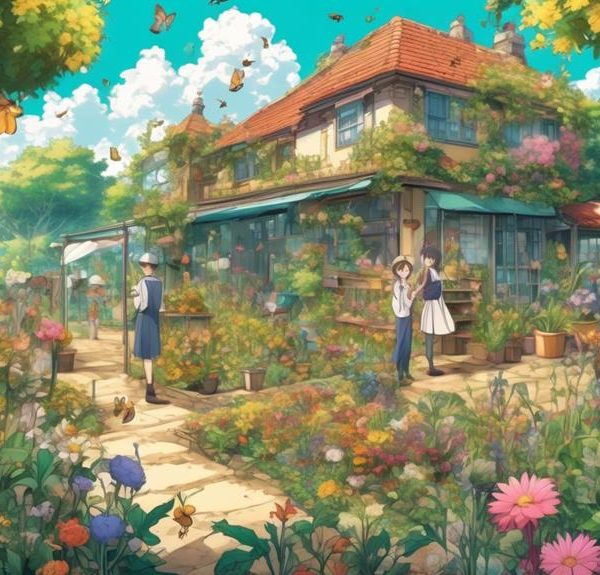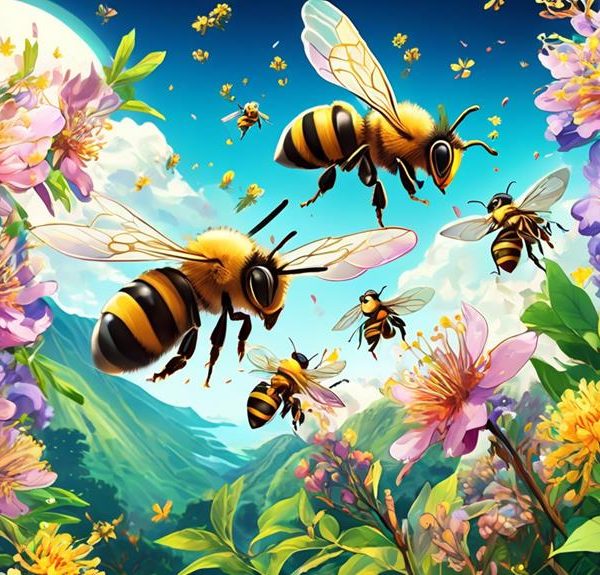Yes, bees might be sipping your morning coffee! Discover the intriguing research behind these buzzing creatures and their potential caffeinated cravings.
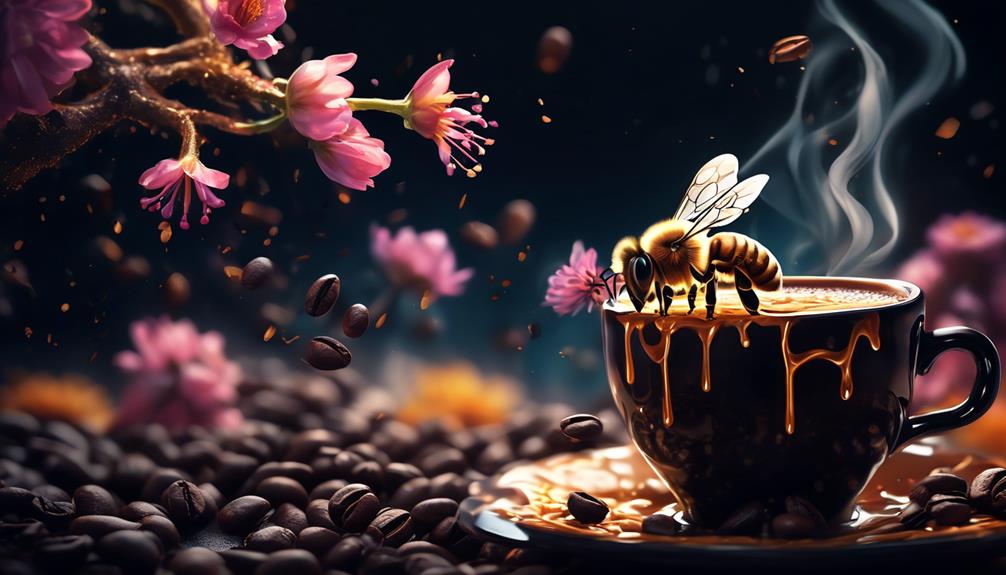
Can Bees Drink Coffee?
Did you know that bees are responsible for pollinating around 70% of the world's plants? Now, you're probably accustomed to seeing bees darting from flower to flower, but have you ever considered the possibility of bees sipping on your morning coffee?
Interesting as it may sound, there's been growing curiosity around this question and it's not just for the fun of it. In fact, recent research points to some rather intriguing evidence that might just change our understanding of these buzzing creatures and their dietary preferences.
So, are you ready to get a fresh perspective on your favorite pollinators and the caffeinated beverage you can't start your day without?
Key Takeaways
- Bees are attracted to coffee plants because of the caffeine-rich nectar, which enhances their memory and learning capabilities.
- Caffeine can have both positive and negative effects on bees, improving their foraging behavior and pollination efficiency, but also disrupting their sleep patterns and communication with the hive.
- Bees exhibit signs of addiction and behavior changes when exposed to prolonged caffeine, leading to a preference for caffeinated flowers.
- Coffee plants rely on bees for pollination, and the optimal levels of caffeine that benefit both bees and coffee farms need to be understood to ensure the health and longevity of bees.
Understanding Bee's Dietary Habits
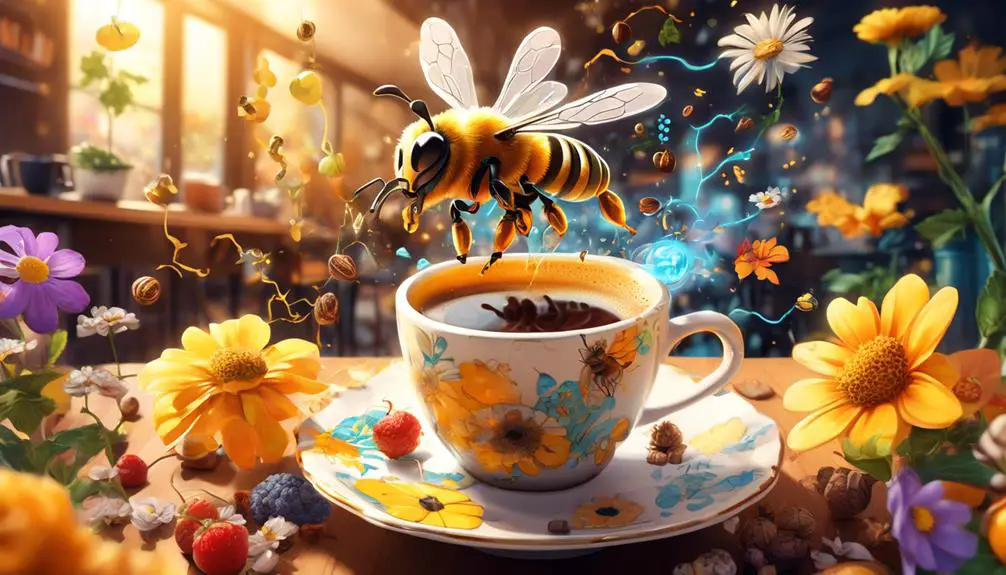
To delve into the dietary habits of bees, it's vital to note that these industrious insects primarily consume nectar and pollen from flowering plants. This vegetarian diet, making bees effectively pollinators, has shaped the evolution of flowering plants and the bees themselves.
You'll understand that their nutritional needs are met by these two sources. Nectar, a sugary liquid, provides them with energy, while pollen is their primary source of proteins and fats, essential for their growth and development. The way bees collect these resources is unique. Their long, tubular tongues allow them to drink nectar from deep within flowers, and their bodies are covered in tiny hairs that trap pollen.
The intriguing part is their selectivity. Bees don't just visit any flower; they're picky eaters. They prefer specific plants, and this preference can vary between bee species. This selectivity is crucial for plant pollination, aiding in biodiversity.
The Appeal of Coffee to Bees
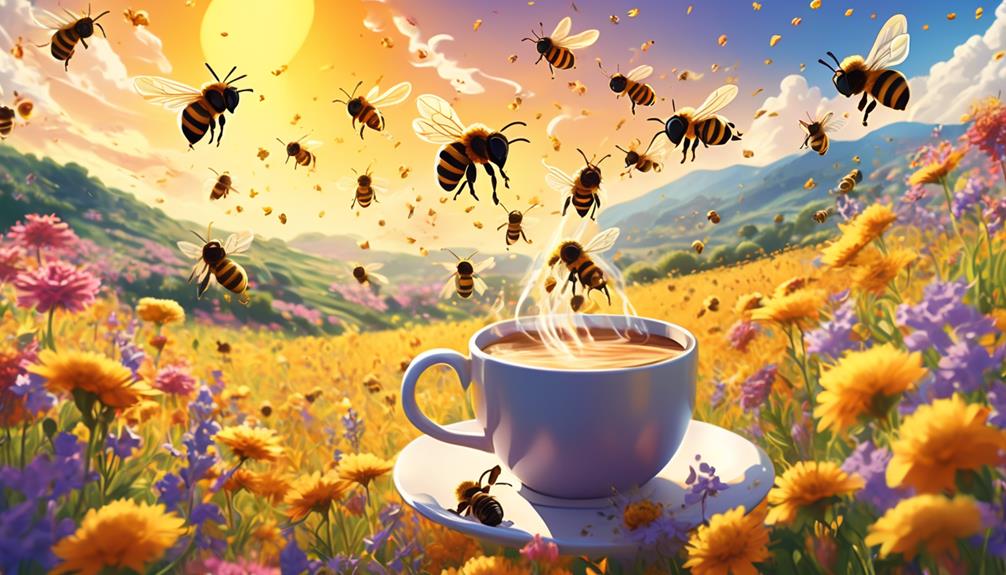
Diving deeper into the bee's unique dietary preferences, you might find it surprising that these little creatures are attracted to coffee plants, specifically to the caffeine-rich nectar. This attraction isn't merely a coincidence but a meticulously evolved trait.
Research suggests that caffeine, in small doses, can enhance a bee's memory and improve their ability to relate a flower's scent with its nectar, making coffee flowers a popular choice. This is a win-win situation, as bees get a memory boost, and coffee plants get pollinated efficiently.
Here are a few insights into why bees are enticed by coffee:
Column 1 | Column 2 | Column 3 |
|---|---|---|
Caffeine Content | Caffeine enhances bees' memory | This makes them more efficient pollinators |
Flower's Scent | Coffee flowers have a distinctive scent | This scent attracts bees and helps them locate the flowers |
Mutual Benefit | Bees get a memory boost | Coffee plants get pollinated |
This symbiosis between bees and coffee plants goes beyond mutual benefits, shaping a fascinating aspect of our natural world. The understanding of this interaction not only answers your question if bees can drink coffee but also sheds light on the intricate balance of nature.
The Impact of Caffeine on Bees
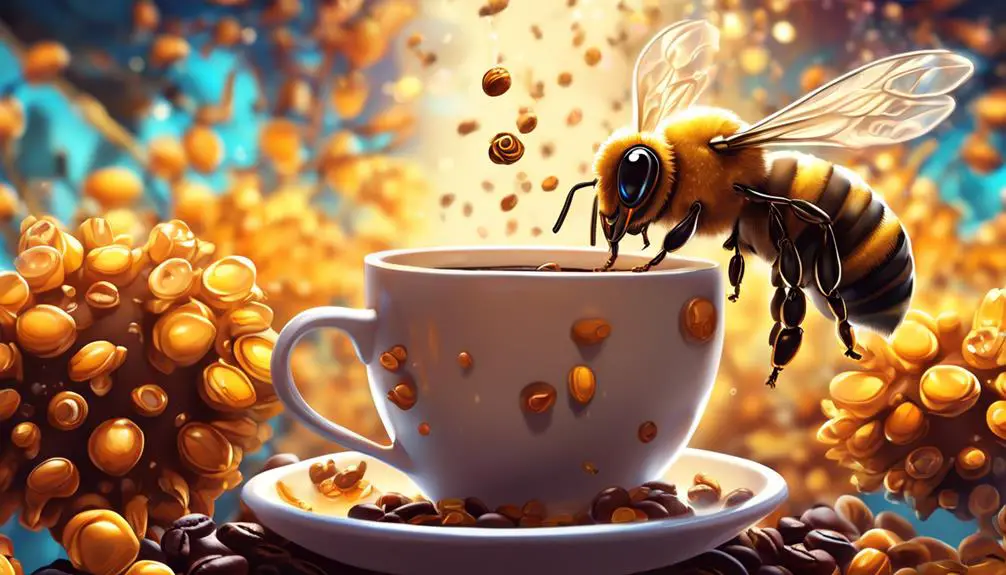
While it's fascinating to note the allure of coffee plants for bees, it's equally important to understand the repercussions of caffeine on these industrious insects.
Scientific research shows that caffeine can impact bees in several ways. It's been found to improve a bee's memory, encouraging them to return to a caffeinated plant. This means that bees are more likely to remember and revisit plants that contain caffeine, leading to increased pollination.
However, there's a downside. Excessive caffeine can also negatively affect a bee's foraging behavior. It can cause overstimulation, lead to poor decision-making, and even disrupt sleep patterns. Yes, bees sleep too! High levels of caffeine can create a kind of 'caffeine buzz' that leaves bees buzzing, literally, and not in a good way.
Additionally, caffeine can interfere with a bee's ability to communicate with its hive. They use a 'waggle dance' to share information about food sources. But too much caffeine can make this dance less precise, leading to misinformation within the hive.
Observations in Bee Behavior and Coffee
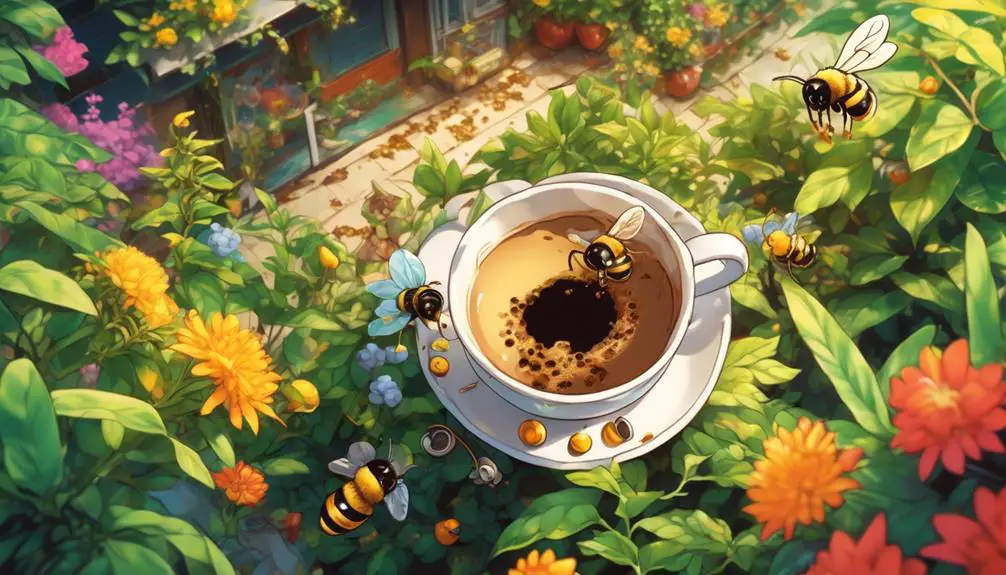
In examining the intriguing interaction between bees and coffee, you'll notice distinct changes in their behavior when exposed to caffeine. Research shows that caffeine seems to enhance the bees' memory and learning capabilities. They start associating the scent of a flower with the sweet taste of nectar, leading to an increased chance of revisiting caffeinated plants.
To give you a clearer picture, let's consider the following table:
Behavior | Without Caffeine | With Caffeine |
|---|---|---|
Memory | Less Accurate | More Accurate |
Learning Abilities | Reduced | Enhanced |
Revisiting Plants | Less Likely | More Likely |
The table above illustrates the stark differences in bee behavior when interacting with caffeine. They're not just more likely to remember the location of caffeinated flowers but also show improved learning abilities.
However, it's not all positive. Prolonged exposure to caffeine can cause bees to exhibit signs of addiction, leading to a preference for caffeinated flowers over others, potentially disrupting the balance of pollination. As interesting as it sounds, it's a balance between benefit and harm. It's a fascinating area of study, shedding light on how even minuscule changes in diet can significantly impact an organism's behavior.
Coffee Farms and Bee Pollination
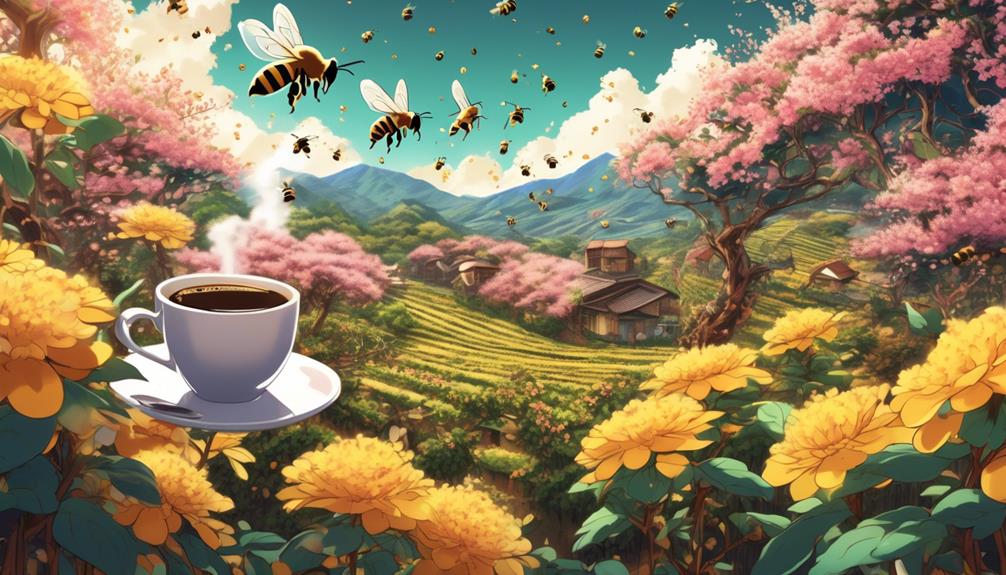
Shifting our focus from the microcosm of individual bee behavior, let's now examine how these caffeine-influenced interactions play out on a larger scale in coffee farms, where bee pollination becomes a critical factor.
You'll find that coffee plants, much like other crops, depend greatly on bees for pollination. The bees' task is to transfer pollen from the male parts of the flower to the female parts, facilitating fertilization and fruit set. In coffee farms, this process is vital as it directly impacts the yield and quality of coffee beans.
So, how does caffeine play into this? Research indicates that caffeine, present in the nectar of coffee flowers, can enhance the bees' memory, making them more likely to return to the same flowers. This increased loyalty to coffee plants can boost pollination efficiency and subsequently, the farm's productivity.
However, it's not all rosy. There's an ecological balancing act at play here. Too much caffeine can turn toxic for bees, affecting their health and longevity. As such, understanding the optimal levels of caffeine that benefit both the bees and the coffee farms is a complex but crucial task.
Implications for Bee Conservation Efforts
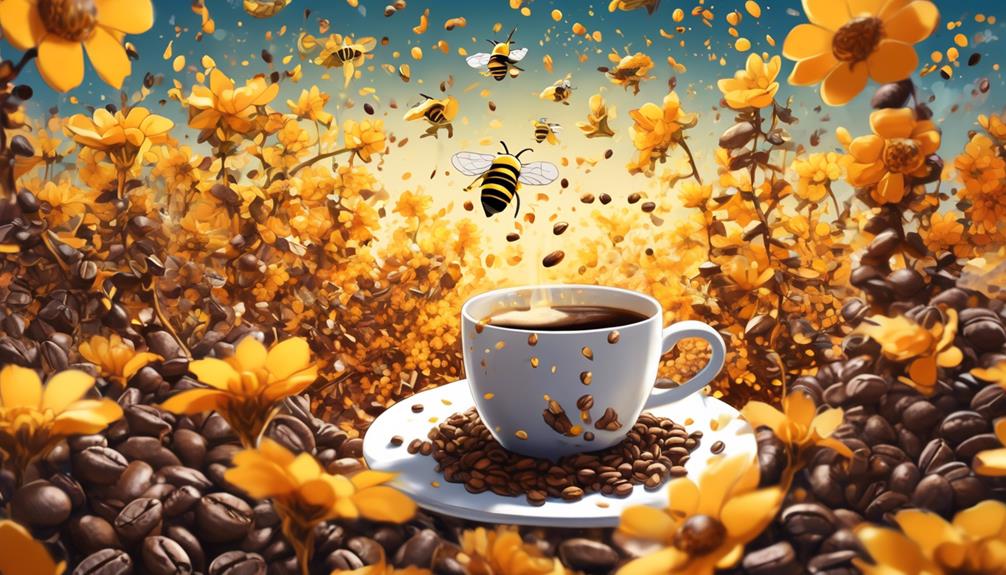
Given the complex relationship between bees and caffeine, it's clear that your conservation efforts must consider both the potential benefits and dangers of this substance to the bee population. Caffeine, in small doses, can enhance a bee's memory and improve its efficiency in pollination. However, high concentrations can prove toxic.
Focusing on the benefits, you might contemplate using caffeine as a tool to boost bee populations. By providing low-dose caffeine sources, bees could improve their ability to locate and remember food sources, enhancing their survival rate. This could potentially mitigate the bee population decline we're currently facing.
On the flip side, it's vital to note that excessive caffeine can harm bees. High caffeine concentrations, especially those found in larger coffee plantations, can create an addictive cycle for bees, leading to poor nutrition and increased mortality rates. Therefore, measures must be put in place to regulate caffeine exposure and ensure the bees aren't over-indulging.
Frequently Asked Questions
Can Bees Get Addicted to Caffeine Found in Coffee?
Yes, bees can get addicted to caffeine. When they're exposed to caffeine, it stimulates their brains and enhances their memory. They're more likely to remember a plant's scent that's laced with caffeine. So, they return to these plants more frequently, which can eventually lead to a form of dependency.
However, it's important to note that this isn't exactly the same as human caffeine addiction. It's more about their foraging behavior being influenced.
How Can We Prevent Bees From Consuming Caffeine if It's Harmful to Them?
You'd need to meticulously manage your garden plants to effectively prevent bees from consuming caffeine.
Avoid planting species that naturally produce caffeine, such as citrus and coffee plants.
Also, don't leave any caffeinated drinks unattended outdoors.
Regularly check your garden for unwanted plants that might've caffeine.
It's a bit of work, but it'll ensure the bees around you aren't exposed to potentially harmful caffeine.
Can Bees Distinguish Between Caffeinated and Decaffeinated Coffee?
Yes, bees can distinguish between caffeinated and decaffeinated coffee. Their sophisticated sensory capabilities enable them to detect caffeine in nectar.
Despite caffeine's potential harmful effects, bees are attracted to it. It enhances their memory and encourages them to revisit the caffeine-laden flowers.
However, if you're trying to keep bees away from caffeine, it's crucial to monitor what they're attracted to in your environment.
How Does Coffee Consumption Affect the Lifespan of Bees?
When you're considering how coffee consumption affects bees' lifespans, it's important to note that caffeine can have detrimental effects. Bees, like humans, can exhibit signs of caffeine addiction.
Over time, this could lead to decreased productivity and could potentially shorten their lifespan. However, more research is needed to understand the full impact.
Are There Any Other Beverages or Food Items That Bees Are Attracted To, Similar to Coffee?
Sure, bees are attracted to many different substances! They're particularly drawn to sugary foods and liquids. For instance, they'll flock to soda spills, ripe fruits, and even floral-scented perfumes.
However, it's not just about the sugar – the aroma plays a big part too. Bees have a keen sense of smell, which they use to find nectar. So, anything with a strong, sweet scent can attract them.
Conclusion
So, can bees drink coffee?
Yes, they can. In fact, they're drawn to it due to its caffeine. This caffeine intake alters their behavior, making them more efficient pollinators. Observations show bees frequenting coffee farms, benefiting both parties.
This unique relationship could even aid in bee conservation efforts. Understanding these interactions further could help us protect these vital pollinators and the critical role they play in our ecosystems.

